By Benjamin J. Wetzel and Kathryn Rose Sawyer
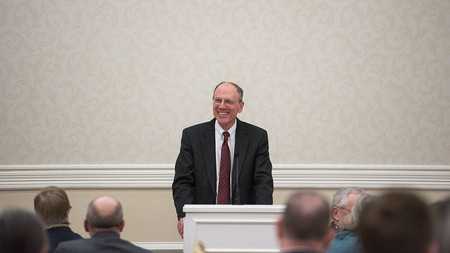 Mark Noll
Mark Noll
In the 1970s, the subfield of American religious history remained on the margins of the historical profession. Often confined to church historians teaching in seminaries, the study of religion had yet to significantly penetrate mainstream academic narratives about the American past. Several developments converged to change this in the decades that followed. The rise of the religious right in the late 1970s and early 1980s certainly stimulated interest among pundits and popular writers about the background of this religio-political movement. Simultaneously, however, another force was at work: a burgeoning scholarly interest in American religious history, especially in its evangelical manifestation. This revolution, write Heath W. Carter and Laura Rominger Porter, was “a deeply collaborative venture.” Yet, they contend, “arguably no single individual loomed so large in the process as Mark A. Noll,” the Francis A. McAnaney Professor Emeritus of History at Notre Dame.1
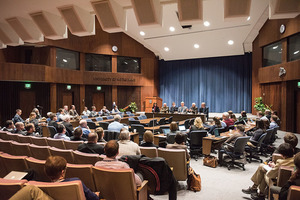
This article considers Mark Noll’s place in the study of American history over the last forty years in light of a recent conference hosted in his honor at Notre Dame. On March 22 and 23, 2018, the History Department and College of Arts and Letters, along with the Cushwa Center, cosponsored Enduring Trends and New Directions: A Conference on the History of American Christianity, organized by co-chairs Jonathan Riddle and James Strasburg with the support of Darren Dochuk, associate professor of history at Notre Dame. The conference theme highlighted the state of the field in the history of American Christianity at the end of a generation of scholarship that witnessed remarkable growth, influenced in no small part by the work of Noll himself. The program included a mix of emerging and established scholars in the field of American Christianity broadly conceived, among them a number of Noll’s current and former Notre Dame graduate students. Speakers and participants traveled from around the U.S., Canada, and Europe to join the discussion.
A career in perspective
Despite the stature of his work, Noll launched his career as a historian in a roundabout way. He graduated from Wheaton College in Illinois in 1968 with a B.A. in English and went on to pursue an M.A. in comparative literature at the University of Iowa before completing a second M.A. in the history of Christianity at Trinity Evangelical Divinity School in 1972. Even then, it was not until his doctoral work at Vanderbilt University that Noll became an American historian, writing his dissertation on Christians in the American Revolution. Upon completing his Ph.D., Noll joined Trinity College in Deerfield, Illinois, as assistant professor of history, a post he held until 1979, when he moved back to his alma mater. He served as Wheaton’s McManis Professor of Christian Thought from 1991 through 2006, when he became the Francis A. McAnaney Professor of History at Notre Dame. Noll taught at Notre Dame until his retirement in 2016. He was elected to the American Academy of Arts and Sciences in 2004 and received the National Humanities Medal from President George W. Bush in 2006.
Noll has steadily contributed to the intellectual life of the Cushwa Center over the years. He served on the center’s advisory board for close to ten years, delivered the keynote address at the spring meeting of the American Catholic Historical Association in 2015 at Notre Dame hosted by Cushwa, and had several of his books featured at the center’s semiannual Seminar in American Religion.
Noll’s work departs from major trends in the writing of the American religious past in two ways. First, he has always defined himself as an historian of North American Christianity specifically, not religion generally. Only a tiny fraction of his writings deal with non-Christian traditions like Judaism or Islam. Secondly, his background in both theology and history contrasts with the training of many American religious historians today who have not necessarily studied academic theology.
Even with these distinguishing features in mind, it is hard to overestimate Noll’s influence on the field, and the best way to understand his academic interests and legacy may be to survey his books. With a few important exceptions, Noll’s writings have primarily examined the cultural, social, political, and intellectual history of American evangelicalism from the seventeenth through the twentieth centuries. A by-no-means-definitive list of his major works in this category includes The Search for Christian America (with Nathan Hatch and George Marsden, 1983), Princeton and the Republic (1989), A History of Christianity in the United States and Canada (1992), America’s God (2002), The Civil War as a Theological Crisis (2006), and In the Beginning Was the Word (2015). Noll is also known for contributions to evangelical theology, Canadian history, and the history of world Christianity. These interests might be best captured in, respectively, The Scandal of the Evangelical Mind (1994), What Happened to Christian Canada? (2007), and The New Shape of World Christianity (2009).
Enduring trends and new directions
Given the achievement those titles represent, it was fitting for Notre Dame to honor Noll with a conference in spring 2018. The Thursday morning session opened with remarks from the conference organizers. Jonathan Riddle and James Strasburg spoke of the easy decision to take on such a project, as “a small way to honor Mark for all he has done” for the field and for his students.
Much of the conference allowed younger scholars to showcase their work with senior faculty serving as chairs and commenters. Thursday morning’s panel sessions began with “Christianity and Culture in Early America,” with Jon Butler of Yale University as chair and Catherine Cangany of Notre Dame as commenter. Peter Choi (Newbigin House of Studies) used the role of imperialism in evangelical Christianity in the 18th century to raise the provocative suggestion that the famous Bebbington Quadrilateral definition of “evangelicalism” be expanded to include a fifth category of “chauvinism” or “imperialism.” Kate Carté Engel (Southern Methodist University) took a “transnational approach to understanding religious community” by exploring the transatlantic networks of “consciously transatlantic” Presbyterians in 18th-century America as they used links in Scotland and England to apply political pressure in the colonies. Joshua Kercsmar (Unity College) raised questions of human and animal rights as he compared the Puritan impulse to exploit for economic gain beings (human and animal) perceived as lacking rationality with the also-present impulse to “save” them by improving or converting them.
Proceeding chronologically, the afternoon began with a panel on “Christianity and Culture in the Long Nineteenth Century,” chaired by Rebecca Tinio McKenna and with comments by Linda Przybyszewski, both of Notre Dame. Danae Jacobson (Notre Dame) spoke about conceptions of religion, labor, and sacrifice among Catholic missionary sisters in the American West, whose work was “central to the colonization of the United States” despite the silence about them in traditional histories. Laura Rominger Porter (Drake University) discussed the shift among white Southern churches at the end of the 19th century towards supporting moral legislation, like Prohibition, due to the breakdown in the social effectiveness of local church discipline. Jonathan Riddle (Notre Dame) examined theological re-interpretations of the Bible among antebellum health reformers who sought religious justifications for their programs of physiological reform.
David Hempton, dean of Harvard Divinity School, gave the keynote address on Thursday evening, speaking about “American Religious History in Global Perspective.” Hempton, originally a scholar of British Methodism, considered the “networks, junction-boxes, and social structures” through which religious ideas and new religious denominations are transmitted. Hempton used the historical precedent of international religious networks to call for scholars of religion on both sides of the Atlantic to better understand the intricacies of the other side. There has never been a more important moment, he concluded, for religious historians to take into account transnational networks.
The first panel of the second day covered “Christianity and Culture in Modern America.” Benjamin Wetzel of the Cushwa Center, Heath Carter of Valparaiso University, and Kristin Kobes Du Mez of Calvin College spoke on topics that challenged traditional definitions of Christianity in broader cultural contexts. The panelists’ topics ranged from Theodore Roosevelt’s underlying Christianity, to situating the Social Gospel Movement within a broader grassroots social reform movement dating to the mid-19th century, to arguing for a definition of evangelicalism based on race and consumer culture rather than the theologically-based Bebbington Quadrilateral.
The second morning panel considered “American Christianity in Global Perspective,” with Scott Appleby of Notre Dame as chair, and Candy Gunther Brown of Indiana University responding. Heather Curtis of Tufts University, and Alison Fitchett Climenhaga and James Strasburg, both of Notre Dame, considered international perspectives, ranging from the use of religious newspapers in spreading American Christianity around the globe at the turn of the 20th century, to American efforts in the post-World War II “Marshall Plan for the churches” in Germany, to the spread of the Catholic Charismatic movement to eastern Africa in the 1970s.
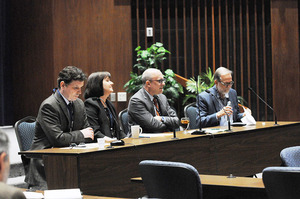 Left to right: Darren Dochuk, Catherine Brekus, John McGreevy, and Thomas Tweed
Left to right: Darren Dochuk, Catherine Brekus, John McGreevy, and Thomas Tweed
While the conference was partly designed to highlight the work of younger scholars, there was also sustained attention to Noll’s work and legacy. Thursday afternoon featured a roundtable discussion on grand narratives in historical work and writing. Catherine Brekus of Harvard University, and Thomas Tweed and John McGreevy, both of Notre Dame, served as discussants, with Darren Dochuk as facilitator. The discussion centered on grand historical narratives shaping the field of religious history and ways of incorporating grand narratives into classroom teaching and historical writing. Brekus spoke about the controversial nature of grand narratives, which necessarily privilege certain “networks of power” over others in an attempt “to explain the world in a coherent way.” McGreevy recognized the value of grand narratives, while cautioning that “weak narratives do more damage than strong narratives do good.” McGreevy argued that the best approach uses local, national, and global registers, and that religious historians are especially well-positioned to do this kind of work since religious actors have always viewed themselves as part of larger communities reaching beyond local and national boundaries. Tweed focused on Noll’s A History of Christianity in the United States and Canada (Eerdmans, 1992), in which Noll brought Canada into the American narrative without masking a history of Protestantism as a general history of religion, as many former grand narratives had done. Tweed looked to new directions for grand narratives, calling for the American story to include the rest of the Western Hemisphere, and for historians to attend to place as much as to periods in defining narratives.
During a reception to wrap up that afternoon, four of Noll’s students (Luke Harlow, Peter Choi, Billy Smith, and Kathryn Sawyer) offered short reflections about his impact on their lives and work.
Likewise, Friday’s lunch session hosted an interview with Noll conducted by John Wilson, former editor of the Christian literary periodical Books and Culture. Noll spoke on various topics including the impact of foreign fields on missionaries, the international turn in Christian historical work, and the role of an author’s Christianity in scholarship.
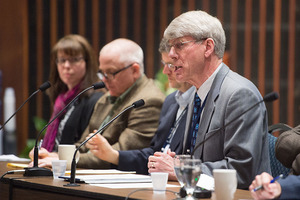 David Bebbington
David Bebbington
Friday afternoon continued with the much-anticipated “Roundtable on the Evangelical Mind,” echoing Noll’s The Scandal of the Evangelical Mind. The roundtable featured some of the most well-known names in the field of Christian history, including David Bebbington (University of Stirling, UK), Tal Howard (Valparaiso University), Thomas Kidd (Baylor University), George Marsden (Emeritus, University of Notre Dame), and Molly Worthen (University of North Carolina). David Bratt of Eerdmans Publishing acted as facilitator.
Each participant offered remarks before the floor was opened to general questions. Bebbington reflected on the continuing applicability of the Bebbington Quadrilateral for understanding evangelicalism and the international scope of evangelical studies thanks to Noll’s scholarly leadership in recent decades. Howard drew on his experiences teaching at an evangelical college for seventeen years to highlight, positively, high biblical literacy among students, the impulse to “do good” in the world, and genuine political diversity on campus; negatively, however, he spoke of students struggling with simplistic understandings of the world’s origins, heavy course loads preventing professors from publishing, and a lack of aspirational confidence in students discouraged by negative connotations of the “evangelical” label in general culture. Kidd spoke of the ongoing “scandal” splitting evangelicals into pro- and anti-intellectual camps. He called for better communication between the “pro” side and those in the middle, emphasizing the need to connect on a personal level rather than focusing solely on academic book writing. Marsden observed that “evangelical thought is more robust today than any time since the early 20th century” but that it has had very little impact on American evangelicalism as a whole, referencing President Trump’s winning over 81% of evangelical voters in the 2016 presidential election. However, he stressed that scholars have never really been influential in the life of the church, and that students in evangelical colleges, while small in number, serve as an “important leaven” in the wider world. Worthen spoke on the current wrestling within the young American evangelical community over its place within evangelicalism and broader American culture and referenced the Canadian situation as a useful comparison for seeing “what is essential and what is distinctive” in Christian culture. A vibrant discussion following the panelists’ remarks drew from all corners of the audience, with the session going 45 minutes over time.
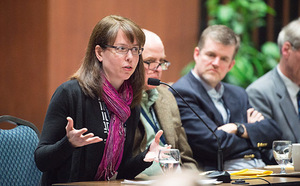 Molly Worthen
Molly Worthen
The second day of the conference wrapped up with a banquet dinner that welcomed participants of the conference and of the Cushwa Center’s Seminar in American Religion, which featured Judith Weisenfeld’s award-winning book, New World A-Coming. Noll offered concluding remarks, which reflected his qualities of generosity and rigorous scholarship that had been highlighted repeatedly by the conference participants over the previous two days.
A generation’s legacy
With over 150 attendees, the size of the conference in March attested to Noll’s reputation. So do a few indicators of the contemporary importance of religion to the mainstream historical discipline. As early as 1991, in an unpublished paper, Jon Butler suggested the scope of the penetration that the work of Noll and his colleagues had achieved in the mainstream historical discipline; he declared the “evangelical paradigm” to be “the single most powerful explanatory device adopted by academic historians to account for the distinctive features of American society, culture, and identity.”2
More recently, in 2009, the American Historical Association released a report relating the results of a survey regarding association members’ research specialties. In that year, “religion” polled the highest out of any subfield, a sea change from just forty years before, when religious history remained on the margins of the discipline. While of course several factors and the work of a generation of scholars contributed to the shift, Mark Noll’s efforts certainly played a leading role in arguing for the centrality of religion to the American experience.
In 1994, Noll endorsed “Evangelicals and Catholics Together,” a statement produced by leaders in both religious traditions. While acknowledging that differences between the two communities remained, the signatories pledged cooperation amongst themselves and stressed points of agreement. Likewise, in 2005 Noll authored (with Carolyn Nystrom), Is the Reformation Over? An Evangelical Assessment of Contemporary Catholicism. The book did not provide a definitive answer to the question but did praise the growing ecumenism in both traditions. In light of this work, it was fitting that the Cushwa Center participated in a conference honoring Noll, since the center itself is committed to ecumenism. There can be no higher mission for the center than to continue to catalyze and provide an intellectual home for the kind of historical work on all aspects of the Christian tradition that Noll and his colleagues have steadily modeled over the past four decades.
Kathryn Rose Sawyer recently earned her Ph.D. in history from the University of Notre Dame. She is assistant program director at the Office of Grants and Fellowships in Notre Dame’s Graduate School.
Benjamin Wetzel is assistant professor of history at Taylor University.
1. Heath W. Carter and Laura Rominger Porter, “Introduction,” in Turning Points in the History of American Evangelicalism, eds. Heath W. Carter and Laura Rominger Porter (Grands Rapids: Eerdmans, 2017), 11.
2. Quoted in Harry S. Stout and Robert M. Taylor, Jr., “Studies of Religion in American Society: The State of the Art,” in New Directions in American Religious History, Harry S. Stout and D.G. Hart, eds. (New York: Oxford University Press, 1997), 19.